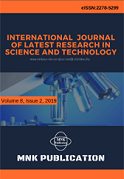DOI:10.29111/ijlrst ISRA Impact Factor:3.35
Research Paper Open Access
International Journal of Latest Research in Science and Technology Vol.5 Issue 1, pp 16-23,Year 2016
Correspondence should be addressed to :
Received : 24 January 2016; Accepted : 04 February 2016 ; Published : 29 February 2016

| Download | 125 |
|---|---|
| View | 177 |
| Article No. | 10604 |
The purpose of the current research is to evaluate the personality profiles of Olympic sports coaches in Turkey within the framework of the Five-Factor Personality Model, and to investigate differences based on gender, national team coaching and coaching grade. A cross-sectional survey method is used as a research design. A stratified sampling procedure was applied, and coaches (nfemale=178; nmale=609) from 23 Olympic sports branches in 10 cities in Turkey voluntarily participated. The mean age of participants was 34.78+8.84. The data collection instruments were the PERI (Personality Inventory), which was used to assess the personality traits of participants; demographic variables were also gathered. The results of the research indicated that Olympic sports branch coaches have the emotional balance personality trait at “not effective or low†levels, the extraversion and openness to experience personality traits at “partially effective or circumstantial†levels and the compatibility and sense of responsibility personality traits at “effective or high†levels. There was no significant difference found between coaching grade and personality traits. Differences in personality traits in terms of coaching duties on the national team were found for compatibility and sense of responsibility, in favor of national team coaches.
Copyright © 2016 Erdal Demir et al. This is an open access article distributed under the Creative Commons Attribution 4.0 International (CC BY 4.0) license which permits unrestricted use, distribution, and reproduction in any medium, provided the original work is properly cited.
Erdal Demir , " Turkish Olympic Sport Branch Coaches? Personality Traits Based \on The Five-factor Model ", International Journal of Latest Research in Science and Technology . Vol. 5, Issue 1, pp 16-23 , 2016

MNK Publication was founded in 2012 to upholder revolutionary ideas that would advance the research and practice of business and management. Today, we comply with to advance fresh thinking in latest scientific fields where we think we can make a real difference and growth now also including medical and social care, education,management and engineering.

We offers several opportunities for partnership and tie-up with individual, corporate and organizational level. We are working on the open access platform. Editors, authors, readers, librarians and conference organizer can work together. We are giving open opportunities to all. Our team is always willing to work and collaborate to promote open access publication.

Our Journals provide one of the strongest International open access platform for research communities. Our conference proceeding services provide conference organizers a privileged platform for publishing extended conference papers as journal publications. It is deliberated to disseminate scientific research and to establish long term International collaborations and partnerships with academic communities and conference organizers.